As we all know, on Memorial Day, a White police officer in Minneapolis knelt on the neck of a Black man named George Floyd for 8 minutes and 46 seconds. Floyd begged for his life. Floyd said he couldn’t breathe. Derek Chauvin refused to move his knee, refused to care. Floyd died a short time later. One Black man murdered in broad daylight by one White cop, whose fellow officers did not intervene. One Black man murdered because he was suspected of trying to pass a fake $20 bill. One man murdered because he was Black.
And the world exploded.
Even in the midst of a pandemic, when we were all supposed to be staying home, this latest injustice was enough to send thousands of people around the world streaming into the streets in protest. Because this video lifted the veil, yet again, and in a particularly blatant way, on racism thriving in our midst. What people understood was that this was not just one White policeman and one Black citizen. It wasn’t one bad apple in an otherwise pristine police force. It wasn’t one isolated incident. Both men were part of a larger system of racism endemic in our culture. It is the air we breathe—so much so that we don’t even see it, especially if we benefit from it. It is the air we breathe, until one man kneels on another and cuts off that air supply.
So today we offer prayers of lament for another life lost, another name added to the ever-growing list of names, some of which we know, and others that we will never know. Say their names.
In the next few minutes, I want to prioritize Black voices, and some of our own voices. Then let’s figure out what we, as a predominantly White congregation, can do. Here are some stories and some voices that we need to hear.
Some of you may remember the Rev. Darrell Goodwin, who was the pastor of Liberation UCC in Madrona as well as Everett UCC. He preached here once a few years back. About a year ago he moved to Nebraska to become an associate pastor for the UCC conference there. He has been pulled over multiple times for driving while Black. He goes out to the protests to deescalate tensions, to pray with people, to put his Black body between the protestors and the police. He has been with peaceful protestors when two White guys on the sidelines started taunting them. He has been out on the streets in peaceful, legal demonstrations when the police—who had invited him there as a peacekeeper—started nailing the protestors with pepper spray and rubber bullets. He is doing his best to bring God’s love in the streets, to practice that love with everyone, no matter how angry they are, or how racist. “Let me do my job,” he says. “Let me do my damn job.” Stop pepper spraying. Stop shooting rubber bullets.
The pastor who replaced Darrell at Liberation and Everett UCC churches is named Jermell Witherspoon, and he serves on the Pacific Northwest Conference board. He put out a statement recently just called “THIS IS THE STATEMENT” (all caps). Here is a part of it.
Repent, the oppressors’ god seeks Genocide, our God seeks justice.
Repent, while there is time, we are the voices in the wilderness, demanding that the Word of our God go forth.
THIS IS THE STATEMENT, WE ARE THE STATEMENT, BLOOD IS THE STATEMENT, DEATH IS THE STATEMENT.
The season's liturgical colors flood our churches. WHAT ARE THE LITURGICAL COLORS FOR THIS SEASON OF SLAUGHTER?
Come, even closer to the earth, place your ear to the ground, listen to its cry. We have very little tears left so WHITE PEOPLE, CRY WITH IT. Do not cry white tears of guilt, but human tears of grief. Cry for us, fight for us, yell for us, change the world, for us. This ask is not because we are not capable, WE ARE RESILIENT. This ask is because we are owed that!
In this hour, where everyone wants to put out a statement, THIS IS THE STATEMENT! The earth, the spirit, the universe is on our side, and if God be real, She will be our vindicator. My advice would be to get on the side of the spirit, for justice is coming like a rushing wind!
—Pastor Jermell Witherspoon
Here’s another voice. The Rev. Michael Malcolm, executive director of Alabama Interfaith Power & Light and the People’s Justice Council writes about how systemic the problem is:
One of my mentors, Nathaniel Smith, reminded me once that “demonstration without legislation only leads to frustration.” The Apostle Paul once said, “For we wrestle not against flesh and blood, but against principalities, against powers, against the rulers of the darkness of this world, against spiritual wickedness in high places” (Eph. 6:12). He might have also said it like this: “We aren't grappling with individuals. We wrestle with systems and policies of oppression.” We deal with a system that emboldens humans to use excessive force that often leads to death. We are dealing with policies that empower extraction, waste, and pollution. We are dealing with systems of thought that make a human look at another human and decide that they are uncommon, unclean, unintelligent, and unworthy because that person’s skin produces more melanin. We are dealing with policies that police communities of color, protect white supremacy, and serve the systems of racism. It’s up to us to end this.
Beloved, if we want this to stop, we need to fight the right fight. Frederick Douglass said, “He who would be free must strike the first blow.” I long for the day when we will reorient to fighting the cause instead of the resulting condition. The causes of oppression, injustice, intolerance, and indifference need our attention. Faith leaders, I beg you to re-imagine a ministry that serves the people and not the ego or building. There is great reward in serving the people. Community leaders, I pray that you stand in holy boldness and continue to declare that the wages of sin is death but the gift of God is eternal life. Stand in solidarity with me. Lock arms with me. Speak up with me. Do something with me. It’s up to us to end this. [Rev. Michael Malcolm, “It’s Up to Us to End This,” UCC Pollinator, Environmental Justice Ministries, May 29, 2020, https://www.ucc.org/it_s_up_to_us_to_end_this?utm_campaign=protest_in_a_pandemic&utm_medium=email&utm_source=unitedchurchofchrist]
This week I attended a UCC webinar where the guests were Bishop William Barber III and the Rev. Dr. Liz Theoharris, the co-leaders of the Poor People’s Campaign. The hosts of this webinar were Traci Blackmon, the associate general minister of Justice and Local Church Ministries for the UCC; and Sandy Sorenson, director of the UCC’s Washington, D.C. office. This was a powerhouse of panelists. They had a lot to say. Here’s the Cliff’s Notes version.
We are living amid multiple pandemics: racism for over 400 years; poverty for longer than that; and COVID-19, which has exposed the vulnerability of those already oppressed by racism and poverty. The first role of our government is supposed to be life, as in “life, liberty, and the pursuit of happiness.” And yet it is the head of our government who is telling our poor people and our People of Color working in meat packing plants that they need to keep reporting to work even if it means they die. Their lives don’t matter. Their right to “life, liberty, and the pursuit of happiness” doesn’t matter. It is the head of our government who tells the protestors, “When you loot, we shoot.” He doesn’t say that to the white-collar criminals who looted millions or billions of dollars from homeowners during the financial crisis of 2008 or any of the financial looting that has happened since then. Why is that?
Accepting death is no longer an option. Deep repentance is required in order to see and change the systemic issues that cripple so many. Protestors still have hope of change; otherwise they wouldn’t be there, putting their lives on the line.
Change must come from below, not from the top. It must come from our pews. We all have to unite around the possibility of something better.
So I asked those of you who have been out marching to tell me about your experiences, and I heard back from a few of you. Here’s what Judy Hooper had to say about her experience on Saturday, June 6:
I joined the Shoreline march (organized by students) last Saturday. Kyrie, Nate, Calvin and Henry and Lyn and Nigel were there along with about 4,000 other involved individuals. Almost everyone I saw was wearing a mask and most were carrying signs and shouting names of people who had been killed by confrontations with the police. I pondered what to put on my sign and decided it would say "Working for Peace and Justice"...it could have said "Walking.....". The majority of signs were for Black Lives Matter and No Justice, No Peace. At the beginning of the march some black students stood with police for a group photo. It felt like a positive moment and set the tone for the march. May the many protest demonstrations that have been held be the impetus for reform that will ensure justice for all.
Peter Henry, who is president of the Seattle Substitutes Association, had this to say about the protest he attended on the same day:
Why did I go down there? I wanted to add my body and my voice. My presence is important. I’m down there, and I’m lending my presence to support Floyd and to honor his sacrifice and to say that that’s got to stop. I’m not the one directly injured, but I’m injured because this is my country. I’m not going to be taking a microphone. I’m there to provide support and listen to other people who have more pertinent things to say. I haven’t had many negative interactions with police, but it was very minor compared to what Black people experience on a day-to-day basis. It’s also my job as a White person to call out other White people. If people are saying stuff that’s in error—if they focus on the rioting—then I can say, What’s important? Black people have been murdered by cops for years. So you’re going to compare some buildings that get damaged to people getting murdered by cops? Those comments are diminishing it. Their sense of discomfort is more important [to them] than someone who’s been beaten down by a cop. I’m there to tell them I disagree.
The word apocalypse means a revealing, an uncovering, a lifting of the veil. The veil is lifted now on the racism that has allowed White people to build wealth and thrive, to own decent homes, go to good schools, earn good money, and pass that wealth on to their children. All the while People of Color, poor people, immigrants work at grunt jobs that don’t pay a living wage, don’t offer health care benefits, don’t treat their people as worthy or valuable. The veil has been lifted. We cannot pretend we don’t know, don’t see. The wounds of poverty and racism are a national threat. Until we take church out into the street to bear witness, to heal those wounds, to work for a better world, we will not be whole.
So what do we do? How do we create the change we wish to see?
Jesus sent his disciples out into nearby villages and towns to preach the good news. Not just in the synagogues, but in the streets, in people’s homes—anywhere and everywhere. Address the needs of the people as you encounter them: heal the sick, feed the hungry, preach and teach wherever you go. In other words, organize. Organize the poor and oppressed, unite them in common cause, and you start to change the world.
So we have to see racism in our midst and how it impacts us, Black and White alike. It makes us uncomfortable, and we just have to learn to deal with that instead of trying to wish it away. I invite us to do a tangible thing, to read a book together: Robin DiAngelo’s White Fragility: Why It’s so Hard for White People to Talk about Racism. We’ll get that going this summer, including opportunities for discussion. Because we have to deal with our own complicity in the racist system that has been handed to us.
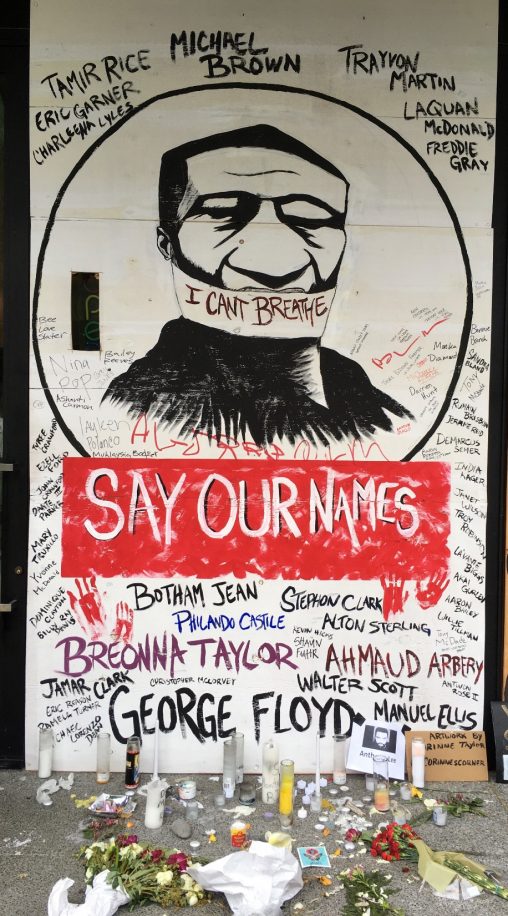
We can educate ourselves. We can lament. We can repent. And we can work for change. What world do you want to see? A world where everyone who is eligible can vote? We can work on that. We can advocate with our legislators. People of faith showing up and identifying ourselves as caring about issues of justice—that has made the difference sometimes with key politicians on important issues.
We are not just tearing down old oppressive systems; we are building up a vision. Jobs that pay a living wage. Expanded health care. Indigenous sovereignty. A redistribution of the national and local budgets to spend less on military and police, and more on education and opportunities for our young people so they don’t have time to get into trouble.
This Friday is Juneteenth, which celebrates the end of slavery in this country. This Saturday, June 20, the Poor People’s Campaign is holding a two-hour online March on Washington to raise voices for the world we want to see. Anyone can be a part of it. I have registered at the Poor People’s Campaign website. You could, too. Let’s be part of the change we want to see.
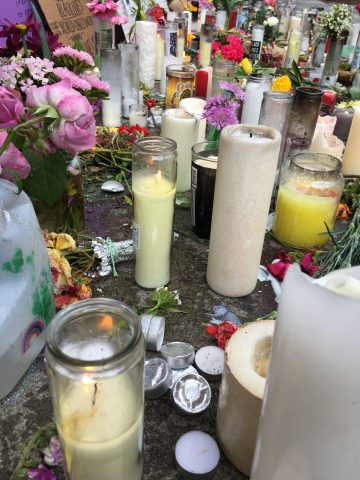
The world is grieving the death of George Floyd, not just because of him individually, but because this death exemplifies so much that is wrong in our culture. Here in Seattle, protestors have created the Capitol Hill Autonomous Zone* surrounding what had been the East Precinct at 11th and Pine. It was being portrayed in some media as a violent and dangerous place. Fox News imposed a photo of a young person standing with a huge gun on several locations—in other words, Fox News made up composite images that never actually happened—and said this was the Autonomous Zone. Fake news.
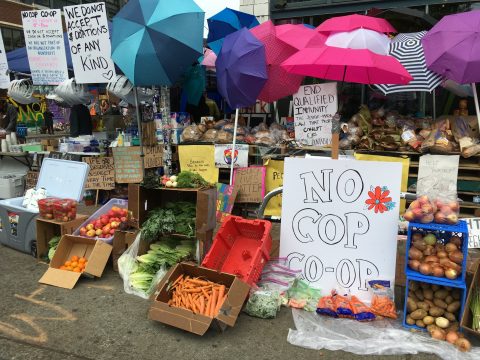
I went to the Autonomous Zone on Friday. Here’s what I saw: couches set out with signs saying “Let’s talk about racism,” or “Let’s make new friends.” A basketball hoop. A “No Cop Co-op” with bins of apples, onions, greens, loaves of bread, donuts—all donated, and all available to whoever could use them. Murals to name and grieve the dead, with candles and flowers strewn
*The Capitol Hill Autonomous Zone has since been renamed the Capitol Hill Occupied Protest, or CHOP.
abundantly underneath. People milling about wearing face masks to keep each other healthy. People walking through with young children. People of different races mixing and mingling (at a distance) peacefully. And signs everywhere—signs quoting Martin Luther King, signs of hope, signs of lament.
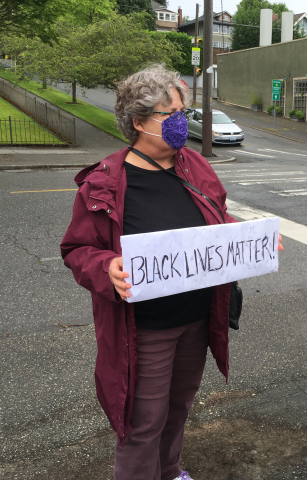
That same day, a dozen of us from Prospect gathered at the church, all wearing our masks, all keeping our distance from each other. We walked to Aloha and 19th and stood there for an hour in the rain with two “Black Lives Matter” signs and the church banner bedecked with rainbows. We waved at every car, every bicycle that passed through that intersection. And when people saw our Black Lives Matter signs, they honked, they gave thumbs up, they waved, they rang their bicycle bells, they cheered. They were young people, old people, Black and White and Brown people.
After just a few moments standing there waving, one person turned to me and said, “I find this very moving. I’m tearing up.” Yeah. When we pull back the veil and see how awful the situation is—and then start to stand up and work for change—it’s exciting. It’s moving. This is Church in the streets.
As a nation, we are having this come-to-Jesus moment about racism. Let’s be on the right side of Spirit and work for change. This movement is peaceful, for the most part. The oppression is deadly and has gone on for way too long. Let us arise, united, to work for the vision of a better world. Like Jesus sending out the disciples, let us take church to the streets. Some of you have been out working there for a long time. [slide of Community Lunch tables] It’s time. And we will discover that church is already there, waiting for us to join the party.
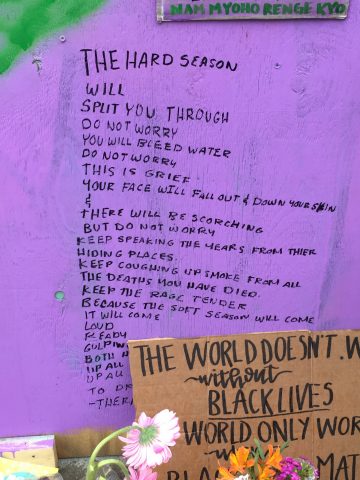
Here is a poem that was written on the wall in a mural at the Autonomous Zone.
The hard season
Will
Split you through
Do not worry
Do not worry
This is grief
Your face will fall out & down your skin
&
There will be scorching
But do not worry
Keep speaking the years from their
Hiding place
Keep coughing up smoke from all
The deaths you have died
Keep the rage tender
Because the soft season will come
It will come
Loud
Ready
Gulping
Both hands in your chest
Up all night
Up all the nights
To drink all damage into love
—therapy
—Nayyirah Waheed
This is church in the streets. Probably very much like what the apostles were doing in the poor communities they served. I’ll see you there. Amen.